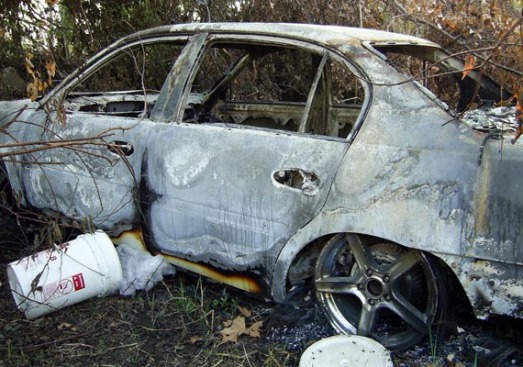[Government vs. YOU] $13 Million Settlement for Katrina/New Orleans Cop Murders & Cover-ups of Unarmed Black People
/ In photo, William Tanner's burned car, in which the remains of Henry Glover were found, on the banks of the Mississippi River. A white cop shot Glover, put him in the car and then set the car on fire while he was still alive.
In photo, William Tanner's burned car, in which the remains of Henry Glover were found, on the banks of the Mississippi River. A white cop shot Glover, put him in the car and then set the car on fire while he was still alive.
From [HERE] and [HERE] New Orleans, Mayor Mitch Landrieu announced the city has reached a $13.3 million settlement over three police brutality cases from the weeks before and after Hurricane Katrina. The settlement covers 17 plaintiffs who brought different claims against the city, including wrongful death and personal injury claims. It comes eight months after six officers involved in the shootings -- two of them fatal -- pleaded guilty to their involvement in the shootings and the subsequent cover-up. Twenty New Orleans police officers were charged in connection with civil rights violations that occurred in the aftermath of Hurricane Katrina.
The cases include the most widely publicized instance of police brutality to emerge from Hurricane Katrina. While trying to escape the inundated city, 60-year-old Lance Madison’s developmentally disabled brother was shot and killed by police officers who open-fired with AK-47s on families crossing the Danziger Bridge in search of food following Hurricane Katrina. In an effort to cover up the murder, Madison himself was arrested and held for weeks, accused of attempted murder.
After finally being released, it would take another 11 years for Madison to get any kind of recognition from the city, to say nothing of justice. Speaking to the New York Times, Madison was mostly unmoved by the settlement. “I guess the only thing that ends is we don’t go back to court anymore,” he said. “It may be closure for them, but it will probably never be closure for me.”
Other plaintiffs in the settlement included the families of Raymond Robair and Henry Glover.
Robair, a 48-year-old handyman, was beaten to death by police officers near his home a month before the hurricane. Several of his neighbors said they saw Officer Melvin Williams approach Raymond Robair on the street in Robair's neighborhood and kick him in the side and beat him repeatedly with a baton, according to the Justice Department.
Officials said after the beating, Williams -- along with a second officer, Matthew Dean Moore -- placed an unconscious Robair into their police car and drove him to Charity Hospital.
According to a Justice Department release, witnesses at the trial said the two police officers falsely informed the hospital staff they found Robair under a bridge and all they knew was that Robair was a drug user. Based upon that information, the hospital treated Robair for a drug overdose rather than blunt force trauma. Robair suffered fractured ribs and a ruptured spleen as a result of the beating. He was pronounced dead within a few hours. [MORE]
His daughter, LaShonda Enclade, was in attendance for the mayor’s announcement. She said that she was ready to forgive the city, but she still struggled to forgive the officers themselves: “The word forgive is a very, very, hard word … I’m not going to say I can ever forgive them. It’s something to be worked on.”
Landrieu noted that as a result of the shootings on the Danziger Bridge and the beating of Robair, the police department is under the most comprehensive federal consent decree in the country. The mayor said that the police department has changed the way it hires, supervises and trains.
In September of 2005, Henry Glover was severely wounded when a rookie police officer guarding a shopping mall in Algiers shot him. The officer did not help Glover, but a passing driver tried to, driving him to a temporary police outpost. Instead of administering first aid, the police there allowed Glover to die, then beat the driver of the car and two members of Glover’s family, left his body in the car, and lit it on fire so that it was unidentifiable except through DNA. Ultimately, three of the five officers who went on trial for the death and cover-up were convicted, although only one of their convictions still stands. [MORE]
Stories like these led to widespread condemnation, and after taking office Landrieu invited the Justice Department to investigate and audit the New Orleans police department. What they found was damning and resulted in a federal consent decree — a mandatory reform that is still in effect — as well as charges for 20 police officers.
Along with the millions in settlement money, the mayor also offered the relatives of victims of police brutality an end to more than a decade of waiting for validation. “There were angels among us that we never knew,” said Mayor Landrieu. “But evidently, there were demons as well.”
Landrieu said the payments in the settlements are expected to be paid out over the next 24 months. Earlier this fall, the City Council authorized city officials to take out loans that would help pay for the settlements. [MORE]












































































































































































































































































